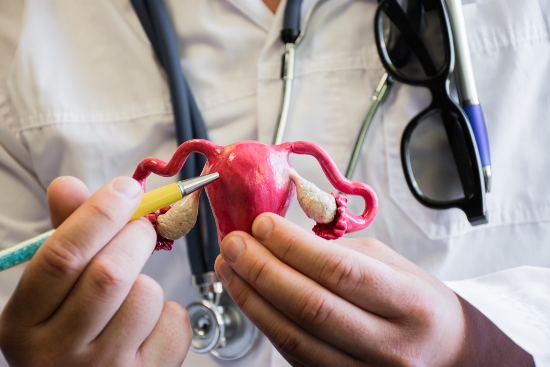Endometriosis in Fort Collins & Loveland
Exceptional Endometriosis Care in Northern Colorado

Since 1965, women in Fort Collins, Loveland, and the surrounding areas have trusted The Women’s Clinic of Northern Colorado to treat their endometriosis. We understand how disruptive this condition can be to your life and are committed to helping you manage it. Our team can quickly diagnose endometriosis and devise treatment plans to alleviate your pain and improve your overall well-being. Endometriosis can affect numerous organs, so come visit us at the first sign of unusual pain related to your menstrual cycle.
What is Endometriosis?
Endometriosis is a condition in which tissue like that which lines the uterus begins to grow outside of it. This abnormal tissue growth can cause pain and various other symptoms, especially during menstrual periods. It can affect various organs including the ovaries, fallopian tubes, and tissues lining the pelvis. The tissue behaves like the uterine lining. It thickens, breaks down, and bleeds with each menstrual cycle. However, it has no pathway to leave the body. Therefore, it becomes trapped and causes pain and complications.
Risk Factors and Causes of Endometriosis
Anyone who has a menstrual cycle is susceptible to developing endometriosis, but several factors can increase your risk. Genetics plays a significant role, so your risk may be higher if your mother or sister has developed the condition. Environmental factors, such as exposure to toxins, may also contribute to endometriosis development. The exact cause of endometriosis is unknown, but some experts believe it may be the result of immune system disorders or hormonal imbalances. Others believe it results from retrograde menstruation, where menstrual blood flows back through the fallopian tubes. But our team is on high alert for endometriosis diagnoses for individuals with the following risk factors:
- Period started at a young age
- Never given birth
- Short menstrual cycles
- High levels of estrogen
Importance of Early Endometriosis Diagnosis
An early endometriosis diagnosis is critical for effectively managing symptoms and preventing further complications. If left untreated, it can lead to chronic pain, fertility issues, and even depression. But by recognizing it early, the experts at The Women’s Clinic of Northern Colorado can tailor a treatment plan to your needs. Our customized care will improve your quality of life and reduce the risk of severe complications. We use state-of-the-art tools to identify endometriosis and begin treatment plans immediately.
Common Symptoms of Endometriosis
Recognizing endometriosis symptoms is the first step toward getting the help you need. Naturally, symptoms will vary, but it is crucial to let us know if you experience:
- Severe menstrual cramps that don’t respond to over-the-counter pain relievers
- Chronic pelvic pain
- Pain during or after sex
- Heavy menstrual bleeding or bleeding between periods
- Fatigue
- Diarrhea
- Constipation
- Bloating
How Can Endometriosis Cause Fatigue?
Fatigue is one of the most overlooked symptoms of endometriosis. Chronic pain and heavy bleeding associated with the condition can lead to significant physical and emotional exhaustion. Additionally, the body’s natural immune response can cause inflammation, which can contribute to feelings of fatigue. Hormonal imbalances and sleep loss due to pain will only exacerbate the issue. Treatment at The Women’s Clinic of Northern Colorado can help reduce your fatigue and help you feel better overall.
High-Quality Endometriosis Treatments
There is currently no cure for endometriosis. However, we can treat your symptoms and help you manage the condition. Based on the severity of your endometriosis and your personal preferences, we may suggest:
- Medication – Pain relievers, hormone therapies, and contraceptives can slow the growth of endometrial tissue.
- Surgery – We can perform surgery to remove the abnormal tissue in severe cases. Additionally, procedures such as laparoscopy can reduce pain and improve fertility.
- Lifestyle Changes – Diet, exercise, and stress reduction techniques can all help manage your symptoms.
Why You Should Choose The Women’s Clinic of Northern Colorado
The Women’s Clinic of Northern Colorado treats patients in Fort Collins and Loveland and all the surrounding areas.. We have more than a dozen board-certified physicians on staff, as well as nurse practitioners, physician assistants, and other professionals who are committed to women’s health. Our expertise helps us recognize and address all types of issues and provide exceptional services to every patient who visits our welcoming clinics.
Schedule an Appointment with Us Today
If you are concerned about endometriosis, let The Women’s Clinic of Northern Colorado help. We proudly treat patients experiencing any kind of women’s health problems, and endometriosis care is among our specialties. So, don’t hesitate to get the care you deserve. Contact us today to schedule an appointment.





